INTERNACIONAL
Trump to host Armenia, Azerbaijan leaders ahead of peace pledge as White House eyes Nobel Peace Prize
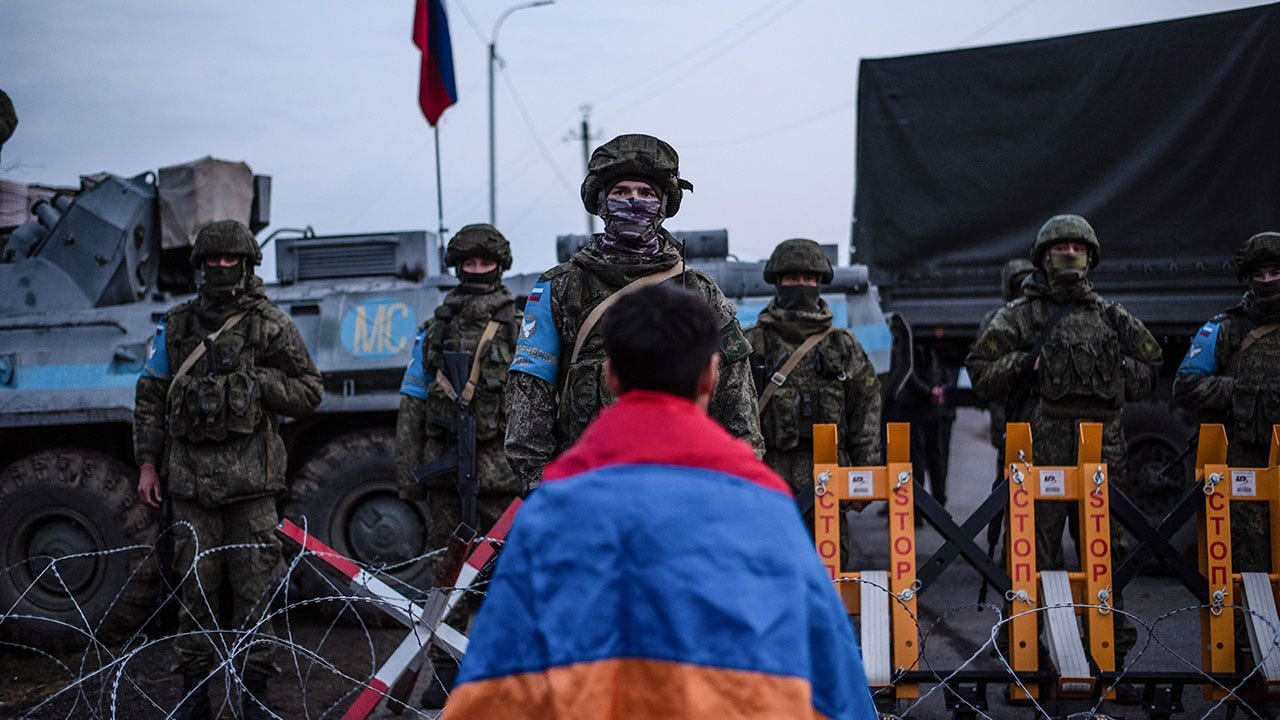
NEWYou can now listen to Fox News articles!
President Donald Trump will host the leaders of Armenia and Azerbaijan on Friday as he looks to secure one more peace deal under his belt following fighting that reignited in 2020.
«I look forward to hosting the President of Azerbaijan, Ilham Aliyev, and the Prime Minister of Armenia, Nikol Pashinyan, at the White House tomorrow for a Historic Peace Summit,» Trump said in a Thursday night social media post.
«President Aliyev AND Prime Minister Pashinyan will join me at the White House for an official Peace Signing Ceremony,» he added. «The United States will also sign Bilateral Agreements with both Countries to pursue Economic opportunities together, so we can fully unlock the potential of the South Caucasus Region.»
Azerbaijani President Ilham Aliyev, right, and Armenian Prime Minister Nikol Pashinyan meet in Abu Dhabi, the capital of the United Arab Emirates, on July 10, 2025. (Azerbaijani Presidency/Handout/Anadolu via Getty Images)
ARMENIA AND AZERBAIJAN MOVE TOWARD NORMALIZED RELATIONS AS THE FIRST BORDER MARKER IS PLACED
Despite the president’s comments, experts familiar with the ongoing negotiations have told Fox News Digital that the leaders are not expected to sign a formalized peace agreement, but rather a letter of intent following more than a year of negotiations.
However, even as an official peace agreement is not expected to be signed, the meeting is still viewed as a major win for not only regional stability, but for Trump as well.
«I believe they’ve had a significant position in this whole process,» Matias Perttula, director of Save Armenia, told Fox News Digital. «We just returned from Armenia over the last week [where] we had several government meetings, including with the national security advisor, the president of Armenia and a couple other ministries, and from what we can tell the engagement from the Trump administration has been a lot more robust than the Biden administration.»
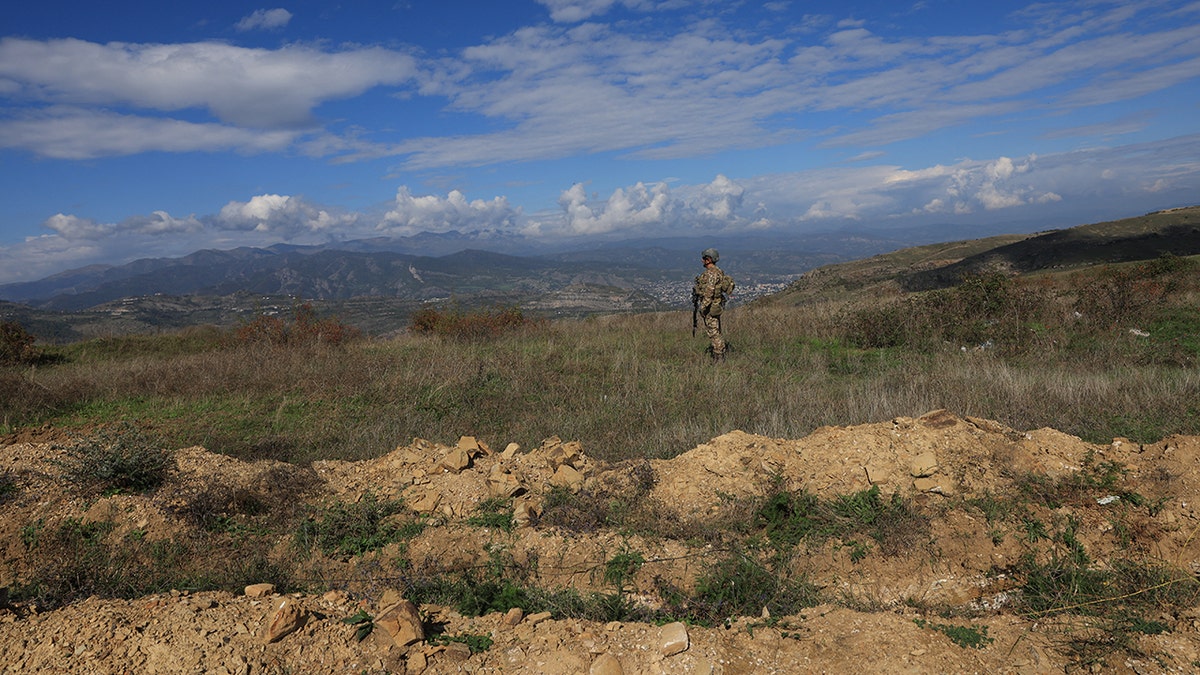
An Azeri serviceman stands near trenches at a former Armenian separatists military position in the village of Mukhtar (Muxtar) retaken recently by Azeri troops, during an Azeri government-organized media trip, in Azerbaijan’s controlled region of Nagorno-Karabakh, on Oct. 3, 2023. ( EMMANUEL DUNAND/AFP via Getty Images)
Azerbaijani President Ilham Aliyev and Armenian Prime Minister Nikol Pashinyan are each expected to meet with Trump prior to signing a pledge for peace between the two nations, which have been embroiled in, at times, brutal conflict since the late 1980s.
The conflict largely centered around the status of the Nagorno-Karabakh region, a mountainous area in Azerbaijan with a majority-Armenian population, but which declared independence in 1991.
While Armenia, along with the international community, never formally recognized the Nagorno-Karabakh Republic as an independent state, it became its chief financial and military backer.
The territory assumed a de facto role in Armenia until Azerbaijani forces overwhelmed the republic in a swift campaign in September 2023, prompting mass evacuations of ethnic Armenians before it was then dissolved on Jan. 1, 2024.
This region is expected to remain a major issue in the ongoing negotiations.
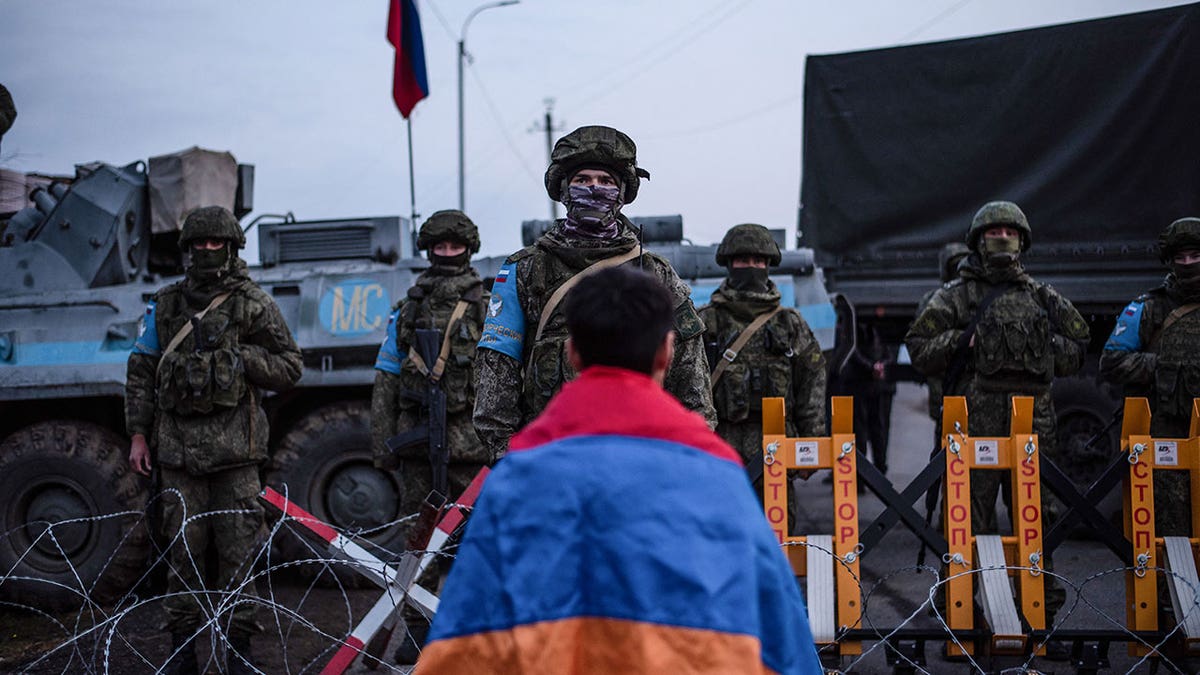
A protester wearing the Armenian national flag stands in front of Russian peacekeepers blocking the road outside Stepanakert, capital of the self-proclaimed Nagorno-Karabakh region of Azerbaijan, on Dec. 24, 2022. (Photo by DAVIT GHAHRAMANYAN/AFP via Getty Images)
ARMENIA’S PRIME MINISTER URGES SWIFT BORDER AGREEMENT TO AVOID CONFLICT WITH AZERBAIJAN
Though both nations announced in March that they had reached a consensus on finalizing a peace deal, several factors surrounding the mountainous area have prevented a finalized agreement from being reached, as witnessed in the July meeting between the leaders when they met in the UAE but failed to find a resolution.
Chief among Azerbaijan’s demands is that Armenia should amend its constitution and remove all references to the Nagorno-Karabakh territory. Though this demand is not a simple request that just Pashinyan can agree to as it would require a national referendum.
«There’s no legal consequence whatsoever,» Perttula told Fox News Digital, explaining that both Armenian and American legal experts have refuted the demand as inconsequential, and therefore should not serve as a precursor to reaching a formalized peace deal.
«There needs to be a real consideration for the right of return for the 120,000 Armenian Christians that were forced off the lands of Nagorno-Karabakh that has been their ancestral homeland for centuries,» Perttula added. «I think that needs to be a key point in terms of formalizing this whole peace agreement.»
«We want peace at the end of the day,» he added. «We want peace and normalization.»
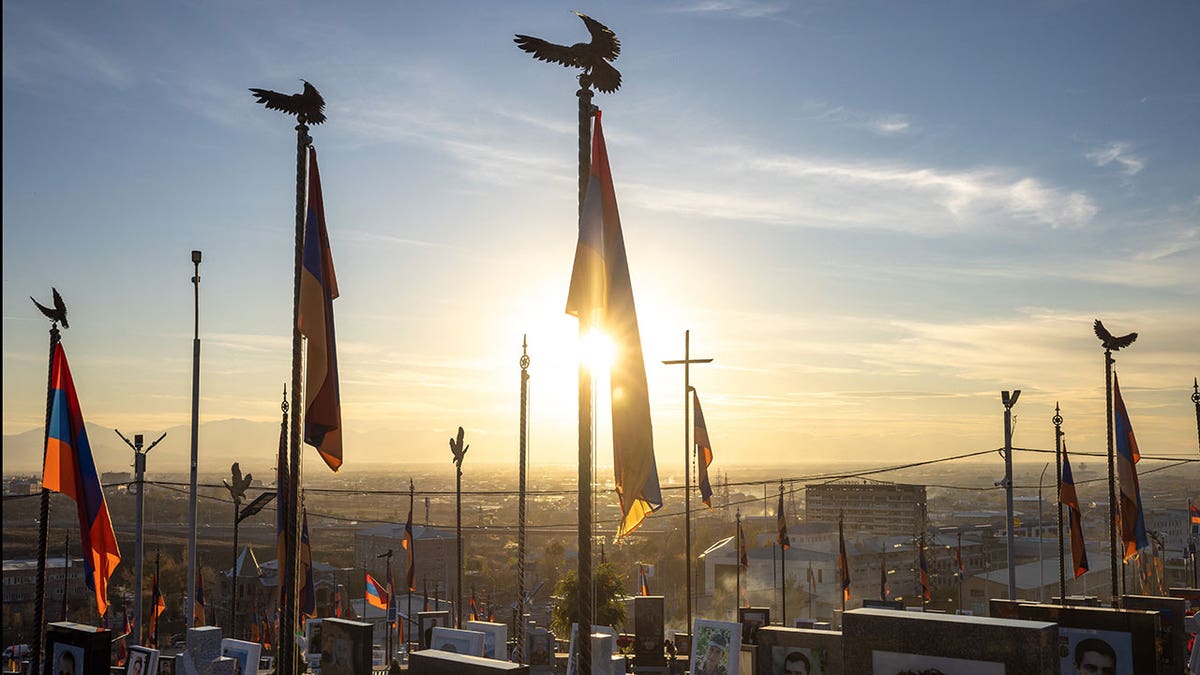
Citizens visit their loved ones at Yerablur Military Cemetery who were killed recently during September in Nagorno-Karabakh. (ANTHONY PIZZOFERRATO/Middle East Images/AFP via Getty Images)
NETANYAHU SURPRISES TRUMP WITH FORMAL NOBEL PEACE PRIZE NOMINATION DURING HISTORIC WHITE HOUSE MEETING
Trump, while on the campaign trail, highlighted the Armenia-Azerbaijan conflict and accused then-Vice President Kamala Harris of doing «NOTHING as 120,000 Armenian Christians were horrifically persecuted and forcibly displaced.»
Trump said he would «work to stop the violence and ethnic cleansing, and we will restore PEACE between Armenia and Azerbaijan.»
Trump has repeatedly championed his push to end conflict across the globe and in June celebrated a peace agreement that the U.S. helped broker between the Democratic Republic of Congo and Rwanda with an Oval Office signing.
«In a few short months, we’ve now achieved peace between India and Pakistan, India and Iran, and the DRC and Rwanda, and a couple of others, also,» Trump said during the event.
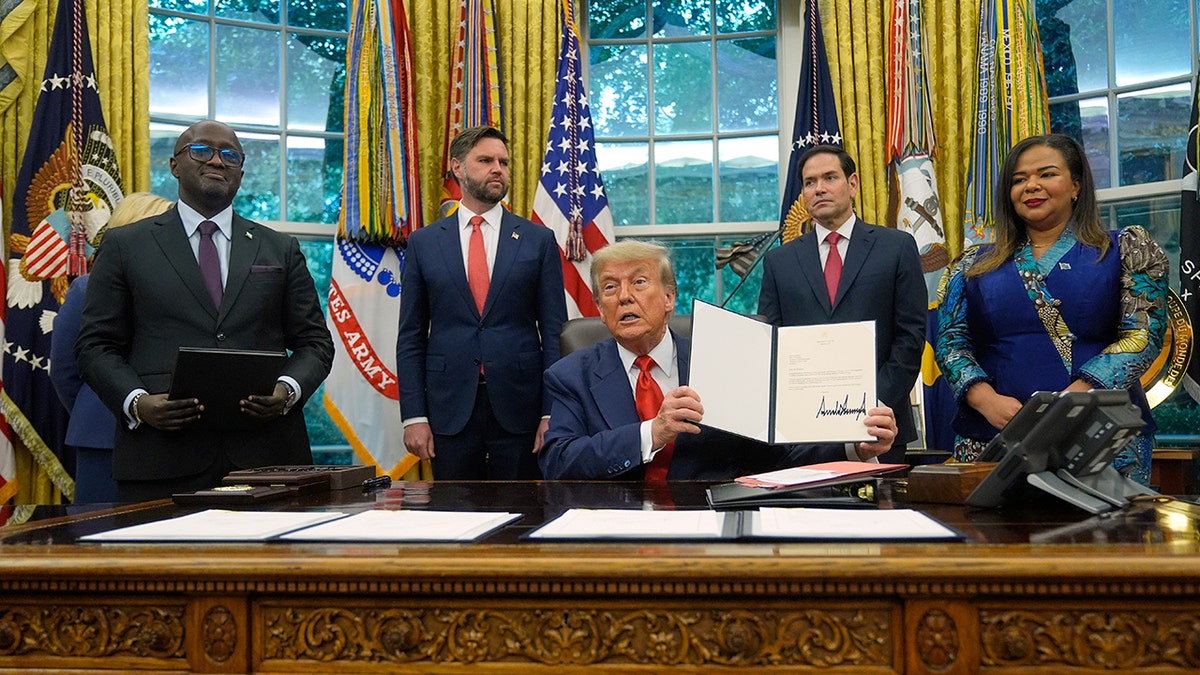
President Donald Trump holds up a signed document to present to Congo’s Foreign Minister Therese Kayikwamba Wagner, right, as Rwanda’s Foreign Minister Olivier Nduhungirehe, from left, Vice President JD Vance and Secretary of State Marco Rubio watch on Friday, June 27, 2025 in the Oval Office at the White House in Washington. (AP Photo/Manuel Balce Ceneta)
CLICK HERE TO GET THE FOX NEWS APP
The president – who has been nominated for a Nobel Peace Prize by Israeli Prime Minister Benjamin Netanyahu, as well as leaders from Pakistan and Cambodia – has on several occasions argued his credentials should be recognized under the international award that has been granted to four other U.S. presidents.
In a February meeting with Netanyahu, Trump said, «They will never give me a Nobel Peace Prize. It’s too bad. I deserve it, but they will never give it to me.»
The White House last week lobbied for the president to win the award come December when White House press secretary Karoline Leavitt said, «It’s well past time that President Trump was awarded the Nobel Peace Prize.»
donald trump,asia world regions,world,conflicts
INTERNACIONAL
Vivieron 23 años como vecinos ejemplares, pero eran espías rusos: la historia que sacudió EE.UU.

27 de junio de 2010. La familia Hetfield- Foley festeja el cumpleaños de su hijo mayor Tim. Cumple 20 años. Almuerzan en uno de los mejores restaurantes de Cambridge, brindan con un champagne caro, comen rico, se ríen. Vuelven a su casa para terminar de preparar todo para la fiesta de la noche. De pronto escuchan fuerte golpes en la puerta, algún grito ininteligible. Alex, el hijo menor de 16, cree que son los amigos del hermano que lo vienen a felicitar, una de esas bromas ruidosas de jóvenes. Hasta que la puerta se abre de manera abrupta. Alguien la rompió de una patada. En un segundo todo se vuelve confuso, impreciso. Hay corridas, gritos, órdenes, golpes, muebles volcados.
Ingresan casi veinte hombres con uniformes y chalecos antibalas. Están armados. Son agentes del FBI. Cuando Alex se repone de la sorpresa y entiende que el FBI ha invadido su casa, piensa que se equivocaron de dirección. Uno de los agentes lo aparta con amabilidad. Le pide que se quede sentado en una silla. Él no opone resistencia. No parece tener miedo, lo domina la perplejidad. Del otro lado de la mesa, ve a su hermano mayor también sentado. Busca con la mirada a sus padres.
Ann Foley, su madre, está tirada en el piso, boca abajo, esposada. Cuando quiere decir algo le gritan que debe permanecer callada. Ella de todas maneras le habla a sus hijos, se esfuerza para que la voz le salga serena: “Tranquilos chicos, vamos a estar bien”. Al padre, Donald Heathfield, lo descubre en la cocina. También está en el piso esposado; uno de los agentes tiene puesta una rodilla en su espalda. Primero se llevan a la mujer; luego, al hombre. Consiguieron que no hablen entre ellos. En la casa quedan sólo los dos chicos y una decena de agentes que revisa cada rincón y va llenando cajas con papeles, carpetas, computadoras y algunos otros implementos tecnológicos que requisan.
Leé también: Decían que oían voces, se hicieron pasar por locos y se internaron: el experimento que cambió la psiquiatría
Se habla poco. Alguna orden de un superior o la pregunta de ¿Esto también lo llevamos? de algún agente. Hasta que Alex se pone de pie y se acerca al hombre que comanda el operativo. Trata de disuadirlo de que están cometiendo un error, de que se equivocaron de casa. El hombre lo mira y de a poco la dureza se va de sus gestos. Con cierta compasión le dice: “Estamos investigando una red de espías rusos en Estados Unidos. Seguro, en un rato, alguien te va a informar mejor”.
Ann Foley y Donald Hetfield no se llamaban así. Sus verdaderos nombres eran Elena Stanislavovna Vavilova y Andrey Bezrukov. Tampoco eran canadienses nacidos en Montreal tal como decían sus documentos y como creían sus dos hijos. Eran espías rusos infiltrados en Estados Unidos desde hacía más de dos décadas. Ese día de junio de 2010 se realizaron otros operativos y detenciones simultáneas en distintas ciudades norteamericanas. Elena Vavilova y Andrey Bezrukov se conocieron en 1982 mientras estudiaban en la Universidad Estatal de Tomsk en Siberia, Rusia. (Foto: AFP)
La noticia provocó una gran conmoción. Una red de espionaje desbaratada de rusos que habían logrado mimetizarse de manera casi perfecta con el American Way of Life. Más que una noticia, más que una historia real, parecía un capítulo de una novela de John Le Carré, el maestro de las novelas de espionaje. Tanto es así que cuando los creadores de The Americans, la serie que se inspiró en Foley y Heathfield, no situó a sus personajes en el Siglo XXI sino en medio de la Guerra Fría y su tensión siempre a punto de explotar.
El plan
Elena y Andrey se habían conocido a principios de la década del 80 en Tomsk, una ciudad de la región de Siberia. Estudiaban historia en la universidad. Se enamoraron y se pusieron de novios. Una tarde, al salir de clases, un hombre se acercó a ellos. Tenía anteojos negros, un sobretodo oscuro con las solapas levantadas, el gesto hosco. Parecía una caricatura de un agente de la KGB, pero era un agente real. Les pidió que lo acompañaran. La pareja aceptó de inmediato porque entendió la situación de manera muy veloz. No se trataba de una invitación, el hombre había emitido una orden que no admitía una negativa. Llegaron a un edificio macizo, sin gracia, una mole rústica y desnuda, soviética.
Les ofrecieron sumarse a la KGB como agentes encubiertos. Los tentaron con un buen sueldo y les aseguraron que el entrenamiento les daría herramientas para realizar con probidad su tarea. Les recordaron que la traición se pagaba con la vida; y hasta dieron a entender que también, en caso de defeccionar, peligraban sus seres queridos. A partir de ese momento recibieron adiestramiento durante varios años. Más allá del uso de armas, de tácticas de ocultamiento, de elementos para codificar mensajes, una de las enseñanzas más importantes era la del idioma. Debían aprender a hablar inglés como un nativo, eliminar de su acento la dureza metálica del ruso. Debían convertirse en norteamericanos en su aspecto, en su cultura, en su habla. En medio del entrenamiento se casaron.
En 1987 viajaron a Canadá de manera separada. Se radicaron en Montreal. Adoptaron la identidad de dos personas que habían muerto hacía muchos años al poco tiempo de nacer, gente que tendría la edad de ellos en ese momento. Se anotaron en la universidad y buscaron trabajo. Simularon conocerse allí mientras cursaban y enamorarse. Se volvieron a casar ahora ante la ley norteamericana. De a poco se introdujeron en sus nuevas vidas. Tuvieron hijos, hicieron amigos, progresaron en sus trabajos, día a día espiaron para la Unión Soviética. Hasta que el imperio colapsó y el gigante implosionó en decena de naciones. La Guerra Fría parecía haber terminado con la caída de la Unión Soviética y la pareja de espías parecía haberse quedado sin trabajo. Nadie les daba órdenes, nadie requería sus informes, nadie los protegía y ni los abastecía. Habían quedado aislados, desguarnecidos, olvidados.

Elena Vavilova y Andrey Bezrukov no eran canadienses nacidos en Montreal tal como decían sus documentos y como creían sus dos hijos. (Foto: AP)
Había dos tipos de espías soviéticos (y luego rusos). Los Legales eran los que tenían trabajos oficiales en embajadas, consulados, empresas rusas; no ocultaban su origen, utilizaban su verdadero nombre y hablaban sin camuflar su acento. Los Ilegales eran, como el matrimonio Foley-Heathfield, rusos camuflados en Estados Unidos o Canadá que se apropiaban de una identidad que no era la de ellos, que actuaban todo el tiempo clandestinamente y que si sucedía algo quedaban librados a su suerte. Los Legales siempre tenían la posibilidad de guarecerse tras la inmunidad diplomática.
Leé también: De carpinteros y plomeros a asesinos en masa: el dilema del Batallón 101 en la Alemania nazi
Este mes se publicó en el país Los Ilegales (Salamandra) de Shaun Walker, una monumental investigación sobre el espionaje soviético-ruso en Estados Unidos. Un tratado de historias reales de espionaje que cubre más de un siglo. Walker es uno de los pocos que pudo entrevistarse con Ann Foley/Elena Stanislavovna Vavilova y toda su familia.
Volvamos a la historia de la pareja Foley. Heathfield o Vavilova-Bezrukov. Después de Montreal, la familia se radicó en Boston, donde Heathfield comenzó a dar clases en Harvard. Mientras tanto abrió por su cuenta una consultora de negocios a la que le fue muy bien. Ann era, según se definió ella misma tiempo después, una Soccer Mom, una madre que se encargaba de la crianza de sus hijos, que los llevaba a las actividades extra escolares, que se encargaba de poner la casa en funcionamiento mientras el marido trabajaba afuera. Lo que nadie sabía era que por las noches, Ann bajaba al sótano de su casa y se pasaba horas encriptando mensajes para mandar a Moscú y decodificando los que les enviaban a ellos. A la izquierda, Matthew Rhys, de la serie The Americans, donde encarnó a Andrey Bezrukov. (Foto: AP y FX)
Nadie conocía su doble condición. Ni sus padres y tíos que habían quedado en Siberia ni sus hijos que vivían convencidos de que eran una familia canadiense como tantas otras. En su casa nunca se hablaba de Rusia y jamás hablaron en ruso delante de sus hijos; los chicos desconocían que sus padres hablaban ese idioma.
A principios del nuevo siglo, el SVR (Servicio de Inteligencia Exterior ruso) los volvió a contactar y su condición de espías renació, fueron reactivados. Donald Heathfield seguía creciendo en su trabajo. Se compraron una casa de tres pisos y vivían totalmente integrados a la sociedad.
Vladimir Putin, con pasado como agente de la KGB, tenía mucho interés en el programa de espionaje, lo fomentaba y pedía a sus funcionarios que lo tuvieran al tanto de todo lo que ocurría. Más allá de la información por conseguir, lo subyugaba la humillación que significaba para su rival que les implantaran agentes en sus entrañas.
Mientras tanto el FBI, que durante años sintió que perseguía fantasmas, (sabían que eran altas las chances de que tuvieran agentes rusos en su país pero no podían dar con ninguno de ellos) dio un paso fundamental. Consiguió que Aleksandr Poteyev pasara a sus filas y se convirtiera en un doble agente. Poteyev era un funcionario de alto rango en el SVR y develó la identidad y ubicación de 11 agentes rusos infiltrados en Estados Unidos bajo la apariencia de ser ciudadanos norteamericanos. Tanto el FBI como la CIA al principio del seguimiento no creían que esas familias fueran rusas. La investigación fue profusa. Pusieron micrófonos en sus trabajos y casas, revisaron sus cajas fuertes mientras ellos no estaban, revolvieron su basura, intervinieron los teléfonos, escucharon conversaciones de sus hijos con los amigos, rastrearon todos sus contactos y actividades financieras. A la izquierda, Keri Russell, de la serie The Americans, en la piel de Elena Vavilova. (Foto: AP y FX)
Los atentados del 11 de septiembre hicieron que la persecución de los espías rusos dejara de ser prioridad, se reasignaron recursos y agentes. Un par de años después volvieron a ser puestos en la mira. Poteyev seguía ascendiendo en el servicio secreto ruso y actualizaba la información mes a mes. Con esos datos cada paso de los espías era seguido y hasta anticipado. En 2008, las más altas autoridades del FBI y la CIA tuvieron una reunión con Barack Obama. Le informaron al presidente, por primera vez, lo que habían descubierto y le dijeron que estaban en condiciones de detenerlos a todos en simultáneo. En pocos meses el presidente ruso Dimitry Medvedev visitaría Estados Unidos en gira oficial en un tiempo en el que las relaciones entre ambos países mostraban un acercamiento. Obama pidió que para no complicar esos avances diplomáticos la operación de desguace de la red se postergara.
Si bien Foley y Hetfield estaban totalmente integrados y era muy difícil descubrir su origen ruso, otros de los integrantes del programa, en cambio, eran menos hábiles, se movían con más torpeza y dejaban sus huellas marcadas en varias de las operaciones.
Leé también: Lo recibían con sonrisas y él los mataba: el médico que se convirtió en el mayor asesino serial de Inglaterra
Recién en junio de 2010 se decidió detener a los espías rusos. Operativos simultáneos que provocaron un cimbronazo. Todos fueron puestos en prisión y permanecieron mucho tiempo incomunicados.

Elena Vavilova Andrey Bezrukov con identidades falsas. (Foto: AP)
Los hijos de la pareja Foley- Heathfield fueron informados en ese momento de la verdadera identidad de sus padres. A las pocas semanas viajaron a París desde donde agentes rusos los llevaron a Moscú mientras los chicos trataban de salir del estado de azoramiento. Allí les presentaron a una mujer anciana. Les dijeron que era su abuela. No pudieron comunicarse porque ella no hablaba inglés y los jóvenes no entendían ni una palabra en ruso.
Unos meses después hubo intercambio de detenidos. Estados Unidos liberó a los once espías a cambio de cuatro disidentes rusos detenidos en Moscú.
Al volver a Rusia, los espías recuperaron su verdadera identidad. Fueron recibidos como héroes, condecorados y la mayoría fue nombrada en puestos ejecutivos en empresas estatales rusas. Un reconocimiento a su labor en el extranjero, una acomodada jubilación anticipada.
Los hijos de Ann y Donald (o de Andrey y Elena) fueron despojados de la ciudadanía canadiense. Pero accionaron ante los tribunales de Montreal para recuperarla. Alegaron que ellos no eran responsables de las acciones de sus padres, que ellos habían nacido en tierra canadiense y vivido allí varios años. El juez les dio la razón y restituyó la ciudadanía.
Aleksandr Poteyev escapó a Ucrania días antes de las detenciones. Allí fue rescatado por miembros de la CIA y trasladado a Estados Unidos donde residió hasta su muerte. Fue protegido por el estado, tuvo un buen pasar económico y votaba por los republicanos en cada una de las elecciones. De todas maneras, su vida posterior no fue tranquila. Tenía custodia permanente y se movía con muchísima cautela. Putin había puesto precio a su cabeza y, hace poco, se supo que pagó varias expediciones a Estados Unidos para que sicarios rusos mataran a Poteyev, el traidor.
Una historia real que inspiró una gran serie. Una gran historia de espías.
espionaje, Unión Soviética, Rusia, Vladimir Putin, Fbi, Sumario
INTERNACIONAL
Taiwan ‘will not escalate, but will not yield’ to Chinese intimidation, foreign minister warns

NEWYou can now listen to Fox News articles!
EXCLUSIVE: Taiwan’s foreign minister says China has «clearly become a troublemaker that is maliciously attempting to disrupt the cross-strait status quo and intimidate peaceful countries.»
In exclusive comments to Fox News Digital, Foreign Minister Lin Chia-lung said China’s intensifying «authoritarian expansionism not only directly threatens Taiwan’s security and democratic system but also poses significant challenges to peace and stability in the Indo-Pacific region and around the world.»
«Last June,» Lin said, «[Chinese] aircraft carriers Liaoning and Shandong maneuvered beyond the second island chain, marking China’s first simultaneous, dual-carrier deployment into the Western Pacific. These developments demonstrate that Beijing’s expansionist ambitions extend far beyond Taiwan and pose an increasingly serious threat to the security and stability of the Indo-Pacific region and the world.»
TAIWAN GENERAL WARNS CHINA’S MILITARY DRILLS COULD BE PREPARATION FOR BLOCKADE OR WAR, VOWS TO RESIST
Taiwan’s Foreign Minister Lin Chia-lung answers questions from media during an international press briefing in Taipei on July 19, 2024. (Photo by I-Hwa Cheng/Afp via Getty Images)
Communist China was founded in 1949 and has not ruled Taiwan for a single day. Officially known as the Republic of China (ROC), Taiwan is currently recognized by eleven small countries, plus the Holy See. Beijing nonetheless rejects the reality of nearly 80 years of separate rule, describing Taiwan as a «sacred and inseparable part of China’s territory.»
China’s posture toward independently ruled Taiwan has hardened in recent years as President Xi Jinping removed term limits and consolidated near-total power. While earlier Chinese statements included talk of «peaceful unification,» Beijing now openly threatens to use force.
In 2024, Xi directed the Chinese military to complete preparations for a Taiwan operation by 2027. Most defense analysts agree that an invasion would be costly, bloody and highly risky for China, Taiwan and any countries that come to Taiwan’s aid, such as the United States or Japan.
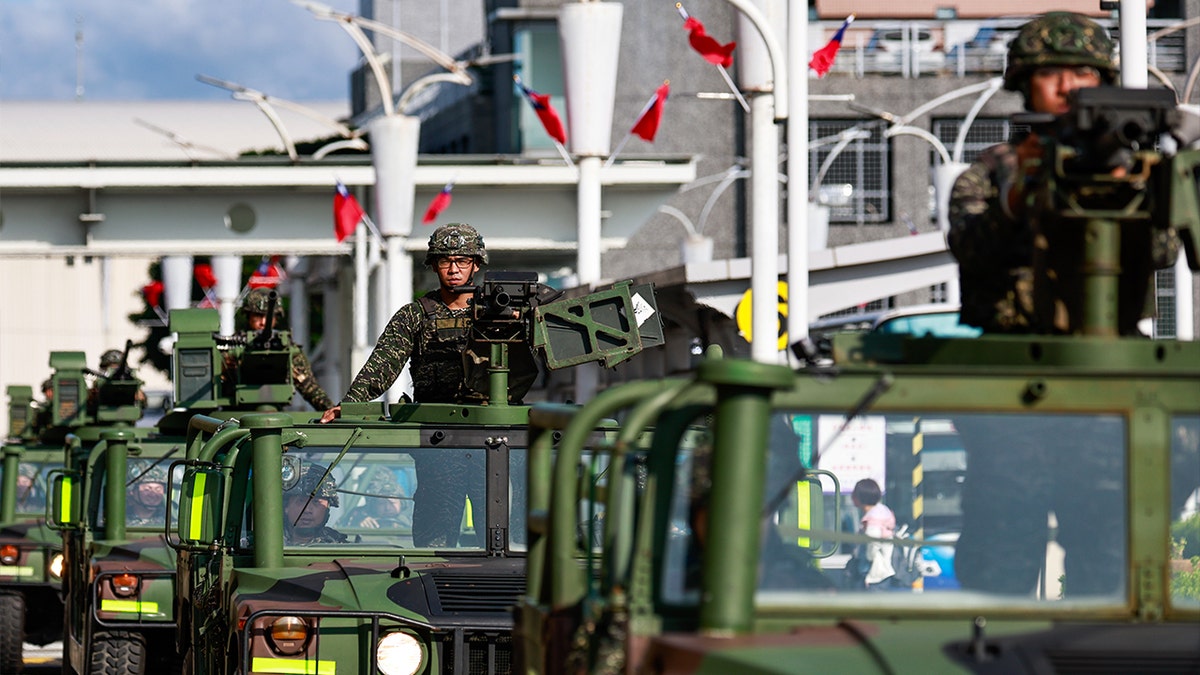
The military exercises mobilizing the Chinese PLA Navy, Army, Air Force and the Chinese Coast Guards, which are deemed as punishment for Taiwan’s refusal to submit to rule by Beijing. (Daniel Ceng/Anadolu via Getty Images)
Lin echoed those warnings that a conflict in the Taiwan Strait would reverberate worldwide. «Peace and stability across the Taiwan Strait are vital to global security and prosperity,» Lin said, noting that approximately 90% of the world’s most advanced semiconductors are produced in Taiwan and that roughly 50% of global commercial shipping passes through the strait. He added that Taiwan is grateful to the United States and other partners for resisting China’s efforts to unilaterally alter the status quo.
The foreign minister said Taiwan’s central role in geopolitics, technology and supply chains ensures that Washington places a high priority on cross-strait stability. He said U.S. policymakers understand that Taiwan’s semiconductor industry and related supply chains are critical to American economic security.
CHINA SURROUNDS TAIWAN WITH WARSHIPS, FIGHTER JETS IN LARGEST MILITARY DRILLS ON RECORD

A nuclear-powered Type 094A Jin-class ballistic missile submarine of the Chinese People’s Liberation Army (PLA) Navy is seen during a military display in the South China Sea April 12, 2018. (Reuters/Stringer)
«There is clear strategic continuity between the policies of President Trump’s first and second terms,» said Lin, adding that Taiwan’s government will seek ways to coordinate with the United States «through values-based, alliance and economic diplomacy.»
Commenting on Washington’s Indo-Pacific strategy, Lin said, «The Trump administration and U.S. Congress continue to demonstrate a steadfast commitment to safeguarding peace and security across the Indo-Pacific region,» Lin said, «which was emphasized in the 2025 National Security Strategy (NSS).» The foreign minister also noted that «the recent NSS released by the Trump administration underscored Taiwan’s geopolitical importance as a link between the Northeast and Southeast Asian theaters.»
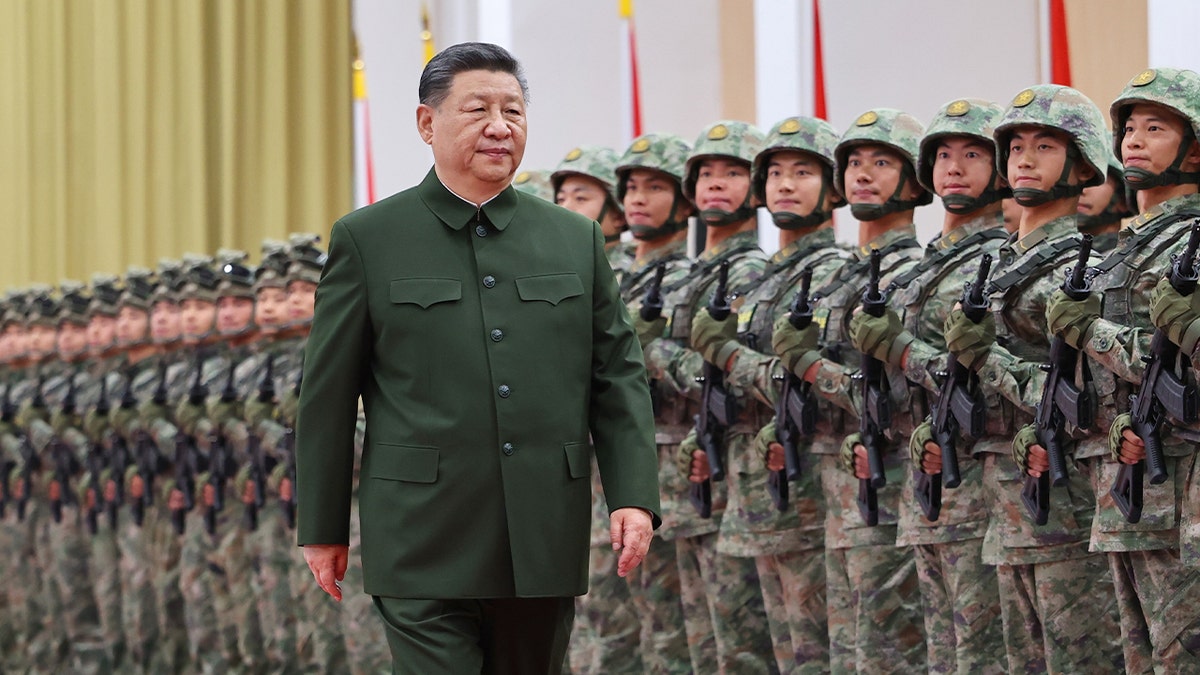
Chinese President Xi Jinping, also general secretary of the Communist Party of China Central Committee and chairman of the Central Military Commission, reviews the troops during his inspection of the Chinese People’s Liberation Army PLA garrison stationed in the Macao Special Administrative Region, south China, Dec. 20, 2024. (Li Gang/Xinhua via Getty Images)
Lin said Taiwan is working to rebalance trade with the United States while strengthening strategic cooperation on AI. «The Trump administration’s AI Action Plan,» he said, «underscores the importance of innovation, infrastructure and international cooperation for AI development.»
He also touted Taiwan’s growing investments in the U.S., including a $165 billion commitment by Taiwan Semiconductor Manufacturing Company (TSMC) in Arizona, and said Taipei is working to make it easier for Taiwanese companies trying to invest in the U.S.. «Against the backdrop of U.S.-China strategic competition and the restructuring of global supply chains,» said Lin, «Taiwan’s enterprises understand the remarkable potential of investing in the United States.»
CLICK HERE TO DOWNLOAD THE FOX NEWS APP

Lin Chia-lung, now Taiwan’s foreign minister, speaks to reporters as then cabinet spokesman on Wednesday, March 24, 2004. (David Hartung/Bloomberg via Getty Images)
The foreign minister said Taiwan appreciates increasing American military support, highlighting that «Last December, the United States approved an arms sales package to Taiwan totaling $11 billion as well as signing the Taiwan Assurance Implementation Act and the National Defense Authorization Act for Fiscal Year 2026. These measures underscore the firm bipartisan support for Taiwan in the U.S. government.»
But he stressed that Taiwan is accelerating its own defense investments. «Last year, [Taiwan] President Lai Ching-te announced that Taiwan’s defense budget would increase to over 3% of GDP by 2026 and rise to 5% by 2030,» he said. While parts of that plan have faced resistance in the opposition-led legislature, both major parties have publicly backed closer security cooperation with the United States and a stronger deterrence posture.
taiwan,china,donald trump,national security,conflicts,xi jinping
INTERNACIONAL
¿El ayuno intermitente ayuda a perder más peso que otras dietas tradicionales?

El ayuno intermitente consiste en alternar períodos en los que se consume muy poca o ninguna energía con otros de alimentación normal.
Es una estrategia que se hizo popular en redes sociales por la promesa de que permite bajar el sobrepeso de manera rápida.
Sin embargo, una revisión de estudios de la organización Cochrane, que está formada por 11.000 miembros, puso en duda ese entusiasmo.
“El ayuno intermitente simplemente no parece funcionar para adultos con sobrepeso u obesidad que intentan perder peso”, afirmó Luis Garegnani, autor principal de la investigación y director del Centro Cochrane Asociado del Instituto Universitario Hospital Italiano de Buenos Aires, en Argentina.

El equipo de investigadores analizó los resultados de 22 ensayos clínicos aleatorizados en los que participaron 1.995 adultos de Norteamérica, Europa, China, Australia y Sudamérica.
En esos estudios, se probaron diferentes modalidades de ayuno, como dejar de comer en días alternos o restringir las comidas a ciertas horas del día.
La mayoría de los ensayos realizó un seguimiento de los participantes durante hasta 12 meses.

El hallazgo central fue claro: el ayuno intermitente no mostró un efecto clínicamente significativo sobre la pérdida de peso en comparación con los consejos alimentarios habituales o con no hacer nada.
Esta conclusión desafía la creencia popular reforzada por el contenido viral en plataformas digitales.

La revisión también examinó los límites y alcances de la evidencia. Los efectos secundarios observados no permitieron a los autores extraer conclusiones definitivas.
“La evidencia científica sigue siendo limitada, con solo 22 ensayos, muchos con muestras pequeñas e informes inconsistentes”, detalló Garegnani.
Otro factor importante es el perfil de los participantes: la mayoría eran personas blancas de países de ingresos altos, por lo que no se sabe si los resultados serían iguales en otros grupos.
“La obesidad es una enfermedad crónica. Los ensayos a corto plazo dificultan guiar la toma de decisiones a largo plazo para médicos y pacientes”, remarcó Garegnani.
La revisión destacó que pocos estudios han considerado los efectos a largo plazo, lo que restringe la posibilidad de hacer recomendaciones universales.
Frente a la popularidad del ayuno intermitente en internet, Garegnani alertó sobre la diferencia entre la percepción pública y la evidencia científica.

“El ayuno intermitente podría ser una opción razonable para algunas personas, pero la evidencia actual no justifica el entusiasmo que vemos en las redes sociales”.
Por eso, los investigadores aconsejaron no generalizar los resultados. “Estos resultados podrían dar pistas, pero no se pueden extrapolar a toda la población, ya que podrían variar según el sexo, la edad, el origen étnico, el estado de la enfermedad o los trastornos o conductas alimentarios subyacentes”, indicó Garegnani.
La cautela ante recomendaciones generales es compartida por Eva Madrid, investigadora de la Unidad de Síntesis de Evidencia Cochrane de Iberoamérica.
“Con la evidencia actual disponible, es difícil hacer una recomendación general. Los médicos deberán adoptar un enfoque individualizado para cada caso a la hora de asesorar a adultos con sobrepeso para adelgazar”, señaló Madrid.

Desde España, Ana Belén Crujeiras, miembro de la Sociedad Española de Obesidad y jefa de Epigenómica en el grupo de Endocrinología y Nutrición del Instituto de Investigación en Salud de Santiago (IDIS), opinó: “Es una revisión rigurosa que cumple con los estándares científicos para las revisiones sistemáticas. Sugiere que el ayuno intermitente no adelgaza más que las dietas tradicionales”.
No obstante, “la calidad de muchos estudios es limitada y el seguimiento, breve, por lo que no puede considerarse la última palabra”, sostuvo Crujeiras al ser consultado por SMC España.
Además, añadió: “El ayuno intermitente puede ser útil en muchos casos; existen evidencias científicas que lo respaldan. Si se realiza correctamente, genera una situación de cetosis nutricional, que puede aportar beneficios para la salud, ya que los cuerpos cetónicos presentan propiedades antioxidantes y antiinflamatorias, además de actuar como moléculas señalizadoras capaces de modular mecanismos epigenéticos”.

Se ha observado que “este estado de cetosis nutricional se relaciona con mejor bienestar y calidad de vida”, afirmó.
La obesidad es una enfermedad crónica que requiere un abordaje integral y personalizado.
Los tratamientos deben adaptarse a cada persona, porque ciertas estrategias funcionan en unos individuos y otras, en diferentes casos, según el estilo de vida, las preferencias y el perfil fisiológico.
La supervisión de un profesional en nutrición o endocrinología resulta imprescindible para encontrar la mejor opción.
alarm,alarm clock,art,background,blue,breakfast,business,clock,color,colorful,concept,conceptual,cooking,creative,cutlery,deadline,design,diet,dinner,dish,eat,eating,flat lay,food,fork,health,healthy,hour,intermittent,knife,loss weight,lunch,lunchtime,management,meal,measure,minimalism,minute,mode,morning,object,office,plate,school,sleep,strategy,time,top view,work,yellow

 POLITICA3 días ago
POLITICA3 días agoEl Gobierno busca aprobar la reforma laboral y el Régimen Penal Juvenil antes del 1 de marzo

 SOCIEDAD3 días ago
SOCIEDAD3 días agoAvistaron una ballena azul en Chubut por primera vez en la historia

 INTERNACIONAL2 días ago
INTERNACIONAL2 días agoChaotic video shows passengers trading midair blows; plane forced to divert: reports



























